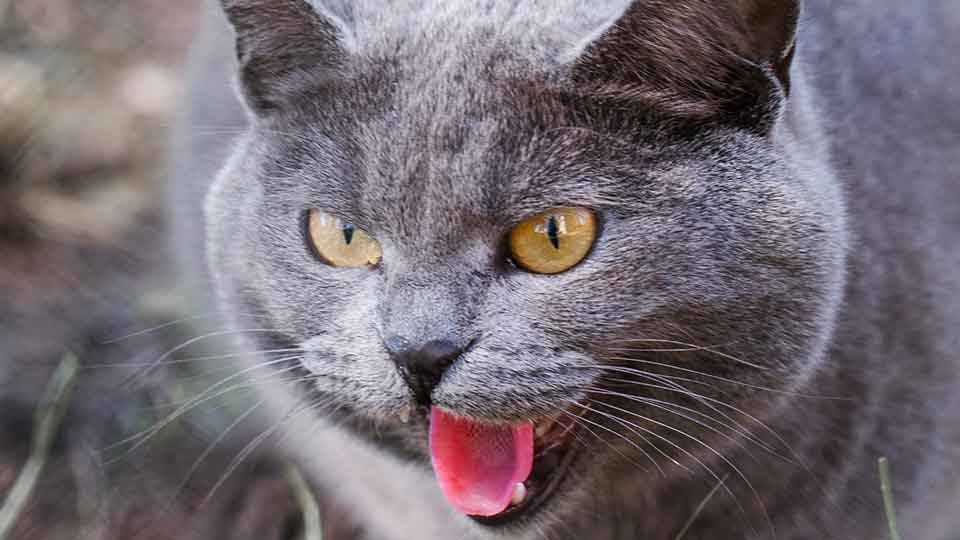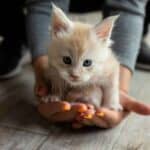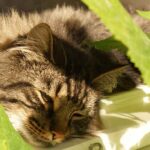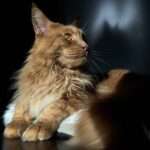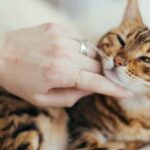Maine Coon cats are not naturally aggressive, but they can become stressed and act out against their owners.
Some factors that can cause stress in Maine Coons are moving to a new home, having a health problem, being overstimulated, fighting over territory, meeting a new pet or baby, or being poorly socialized as a kitten.
Maine Coons are one of the biggest breeds of domestic cats, and their size and appearance can make people scared of them. However, they are usually friendly and gentle with strangers.
People may wonder if Maine Coons are aggressive or not, but they should not judge them by their looks.
If you want to learn how to prevent or reduce aggression in your Maine Coon, you should read on. You may be unknowingly teaching your Maine Coon to be more aggressive.
Are Maine Coon Aggressive to Other Cats?
In general, most Maine Coon cats live up to their “gentle giant” reputations and do very well with other pets when properly introduced.
But Maine Coons can potentially show aggression toward other household cats in specific scenarios:
- A new cat is introduced too quickly without gradual acclimation. The Maine Coon may feel territorial.
- Competition arises over resources like food, water bowls, litter boxes, prime napping spots, or human attention.
- One cat challenges the other cat’s social status with dominant postures or behaviors.
- A medical issue or pain makes the Maine Coon irritable and lash out at housemates.
- A new cat resembles one the Maine Coon had social issues with, causing instinctual reactions.
Inter-cat aggression can often be prevented or managed with slow introductions, separating resources, and addressing medical problems.
But you should be vigilant if tensions arise and be ready to intervene for everyone’s safety. Let’s explore other potential causes for aggression next.
7 Reasons Why Your Maine Coon Is Aggressive
From my own experiences and research, these are some of the most common reasons even mellow Maine Coon cats can display occasional aggression:
| Reasons of Aggression | Description |
|---|---|
| Threatened | They feel scared or threatened by another animal or person. |
| Hormones | They are not spayed or neutered and have high levels of hormones that make them more territorial, vocal, and mating-oriented. |
| Stress | They are stressed by changes in their environment, such as moving to a new home, introducing a new pet or person, or rearranging the furniture. |
| Pain | They are in pain or discomfort due to illness, injury, or dental problems. |
| Territorial | They want to defend their space, food, water, litter box, or bed from another cat or person. |
| Overstimulation | They are overstimulated by too much play, petting, or attention and want to tell you to stop or slow down. |
| Boredom | They are bored or lack stimulation and want to release their pent-up energy and frustration. |
1. Threatened
Your Maine Coon may act defensively aggressive if they feel threatened or afraid.
Aggression is a protective instinct when cats feel in harm’s way. Situations that can trigger this include:
- Being cornered with no escape route
- Sudden loud noises or movements
- Unfamiliar visitors in their territory
- Cats or dogs intimidating with direct stares or chase behavior
- Painful handling like a child pulling their tail
Sometimes, the threat might even come from your side. Your Maine Coon may be aggressive with you if they feel scared or threatened by something you do or say.
You should check if you are doing any of these things:
• Yelling or scolding your cat.
• Hitting or hurting your cat.
• Moving your cat against their will.
• Wearing a new perfume that your cat dislikes.
These actions can make your cat feel unsafe and defensive. You should try to avoid them and change your behavior. Here are some tips to follow:
• Talk to your cat softly and calmly.
• Never hit your cat. Hitting teaches cats to be more aggressive.
• Some owners say their Maine Coon reacts badly to certain perfumes. If this happens to you, stop using it.
Maine Coons will usually try to retreat or hide first when feeling threatened. But if trapped or scared enough, aggressive hissing, swatting, and biting can happen.
Remove the perceived threat and give them space to calm down.
2. Hormones
Hormonal influences like reproductive cycles or seasons can make Maine Coons more territorial and short-tempered. Watch for aggression tied to these events:
- Un-neutered males are more likely to roam, pick fights, and use urine marks to establish dominance. Neutering reduces testosterone and usually resolves this.
- Unspayed females can become more aggressive before and during estrus cycles as hormones fluctuate. Spaying prevents cyclical hormonal aggression.
- Maternal aggression – mothers with kittens may act defensively aggressively to protect their young. It usually resolves once kittens are weaned.
You should think about getting your Maine Coon neutered when it becomes serious. It is a good idea because it stops them from having unwanted kittens.
It also helps them stop spraying on your furniture and walls, and makes them less aggressive by lowering their hormone levels.
The two medical procedures are:
• Castration: The vet removes both of the male cat’s testicles. This takes away the main source of the male hormone testosterone.
• Spaying: The vet removes the female cat’s ovaries and uterus. This prevents them from getting pregnant.
You should get your Maine Coon kitten neutered around 4 months old, after they get their main vaccination shots. This is important because a kitten can start mating around five months old.
However, some vets may prefer to neuter kittens around five months old, so you should check with your vet first.
But do note that your vet cannot reverse this medical intervention. So do not neuter them if you want to breed your kitten.
3. Stress
Stress from changes in environment, routine, owners, or social dynamics can cause anxious aggression in Maine Coons.
Watch for aggression after events like:
- Moving homes
- New family members or pets
- Renovations with extra noise/activity
- Traveling like holidays or boarding
- Owner absences like vacations or hospital stays
Try to minimize stress with gradual transitions when possible.
Use calming aids like pheromone diffusers and plenty of enrichment toys during changes.
If aggression persists, talk to your vet about anti-anxiety medication options.
4. Pain
Aggression tied to touching, being handled, or having sensitive areas approached may indicate your Maine Coon is in pain. Causes can include:
- Dental disease, mouth/jaw injuries
- Arthritis, muscle strains
- Injuries, surgical sites
- GI issues like constipation, inflamed pancreas
- Urinary tract, and bladder infections
- Ear aches
But how to tell your cat is in pain?
Recognizing pain in cats can be challenging because they’re masters at hiding discomfort.
This is a survival instinct to avoid appearing vulnerable to predators.
However, there are several signs you can look out for to determine if your cat, including a Maine Coon, might be in pain:
1. Changes in Behavior: If your usually active and social cat suddenly becomes withdrawn and inactive, it might be experiencing pain.
Conversely, a typically calm cat may become agitated or aggressive.
2. Changes in Appetite: A decrease in appetite or sudden weight loss can signal that your cat is in discomfort.
3. Difficulty Moving or Limping: If your cat is having trouble getting up, jumping, or is limping, this could indicate pain, particularly in their joints or limbs.
4. Changes in Grooming Habits: Cats are meticulous groomers. Changes like grooming less often, not grooming certain areas because it’s painful, or excessively grooming a specific area, trying to soothe a painful spot, can all be signs of pain.
5. Unusual Vocalizations: Cats in pain may become more vocal. Listen for increased hissing, growling, moaning, or purring.
6. Changes in Litter Box Habits: If your cat is avoiding the litter box or seems to have difficulty or pain while urinating or defecating, it might be in pain.
7. Changes in Sleeping Patterns: Cats sleep a lot, but if your cat is sleeping even more than usual, or less, this could suggest it’s in pain.
8. Changes in Body Posture: A hunched or protective body posture, reluctance to move, or discomfort when picked up or touched might indicate pain.
9. Changes in Facial Expression: Cats in pain might squint or have a glazed, distant look. Their eyes may be partially closed, and their third eyelids might be visible.
Remember, these are all potential signs of pain but can also indicate other health issues.
You might schedule a vet exam if your once sweet Maine Coon now hisses or bites during handling.
Treating the painful condition and using temporary pain medication will often resolve the aggression.
5. Territorial
Maine Coons can be very attached to their territory and owners.
For example, a cat may act aggressively and territorially if a new cat joins their household or if an unfamiliar cat enters their area. Male Maine Coons are more likely to defend a larger area than females.
Aggression may erupt when they feel that bond threatened, such as with:
- A new romantic partner moving in
- Introduction of a new baby
- House guests occupying their space
- A new pet competing for attention
Patience and slow introductions can help a territorial Maine Coon adjust.
Let them approach newcomers in their own time and give them ample affection. Reinforce that all good things still come from you.
6. Overstimulation
Maine Coons are energetic, playful cats, especially as kittens.
But too much petting, play, or activity can overstimulate them, resulting in reactive swats or bites. Signs of overstimulation include:
- Restlessly moving away from petting
- Twitching tail
- Ears flattening
- Skin rippling
When you see these cues, give your Maine Coon space to calm down.
Follow their lead for when they’ve had enough handling or playtime. Proper stimulation balancing prevents aggressive reactions.
7. Boredom
A lack of sufficient physical and mental stimulation can cause restless aggression in Maine Coons. Make sure your Maine Coon cat has:
- Daily interactive play sessions
- Outdoor access or a catio for entertainment
- Puzzles and treat balls that reward their hunting drive
- Climbing cat trees and perches
- Changing up toys to keep novelty
Prevent boredom-based aggression by tiring your Maine Coon out with play and providing enriching solo activities during the day. A good playtime before bed helps curb restless, reactive moods.
How To Tell An Aggressive Maine Coon?
Telling whether a Maine Coon is displaying aggressive behavior involves understanding both their body language and actions.
Here are some signs that your Maine Coon may be acting aggressively:
- Body Posture: An aggressive Maine Coon may have a stiff body posture. They might arch their back, puff up their fur to appear larger, or position their body sideways to a perceived threat.
- Ears: The position of a cat’s ears can tell a lot about their mood. If your Maine Coon’s ears are flattened against their head or turned sideways, this could indicate aggression.
- Tail: A puffed-up or lashing tail can indicate aggression in cats. If your Maine Coon’s tail is puffed up like a bottle brush, or if they are vigorously swishing or thumping it, they might be displaying aggression.
- Eyes: Dilated pupils or intense, focused staring can be signs of aggression in cats.
- Vocalizations: Aggressive Maine Coons may hiss, growl, or yowl. These sounds are usually a clear indication that your cat is upset or feeling aggressive.
- Biting or Scratching: If your Maine Coon is biting or scratching more than usual, especially outside of play, this can be a clear sign of aggression.
Remember, these signs do not necessarily mean your Maine Coon is naturally aggressive; they might be reacting to a certain situation or stimulus.
Look for patterns around what triggers the behavior. The sooner you can identify the root cause, the faster you can take steps to resolve the aggression through training, environment changes, or medical care.
How To Discipline A Maine Coon Cat?
1. Use Positive Reinforcement
It is one of the most effective methods to discipline not just Maine Coons, but any cat.
Cats, like most animals, respond well to rewards.
Positive reinforcement involves rewarding your cat for good behavior to encourage them to repeat it.
This could be in the form of their favorite treats, praises, or extra playtime.
For example, if your Maine Coon uses the scratching post instead of the furniture, reward them with a treat or a petting session.
Over time, they will start associating the scratching post with positive outcomes and will be more likely to use it.
2. Ignore Bad Behavior
Although it might seem counterintuitive, ignoring bad behavior can be an effective method of discipline.
Cats often act out to get attention, and by reacting, you may be encouraging the behavior, even if the attention they receive is negative.
If your Maine Coon is exhibiting bad behavior, such as biting or scratching during play, calmly walk away and stop interacting with them.
This can help them understand that their actions are unacceptable and do not yield the desired attention.
3. Redirect Their Attention
Redirection is another effective strategy, especially for cats that are engaged in destructive behaviors.
If your Maine Coon is doing something they shouldn’t, try to distract them with a toy or engage them in a different activity.
For example, if they are scratching the furniture, redirect them towards a scratching post.
Or, if they are biting your hands during play, substitute your hand with a toy.
Over time, they will learn what items are appropriate to scratch or bite.
4. Never Use Physical Punishment
It’s essential to remember that physical punishment is not an effective or humane method of discipline.
Physical punishment can make your Maine Coon fearful or aggressive, and it won’t teach them the appropriate behavior.
It can also harm your relationship with your cat and make them wary of you. Instead, focus on positive reinforcement and redirection.
5. Provide Plenty of Physical and Mental Stimulation
Maine Coons are an active and intelligent breed. They require plenty of physical exercise and mental stimulation to keep them happy and prevent boredom.
A bored Maine Coon may exhibit destructive behaviors to entertain themselves.
Make sure your cat has access to various toys and stimulating activities. Interactive toys, puzzle feeders, and regular playtime with you can help keep them entertained.
Also, ensure they can access a safe outdoor view, as watching birds and other outdoor activities can provide mental stimulation.
6. Create a Safe and Enriched Environment
Make sure your Maine Coon has an environment that meets their needs. This includes multiple scratching posts, access to high places (like cat trees or shelves), hiding spots, and a quiet, safe space where they can retreat if they feel stressed or scared.
An environment that meets a cat’s natural needs can prevent many behavioral problems.
7. Regular Routine
Cats thrive on routine, making them feel secure.
Keep your Maine Coon’s feeding, play, and sleep times consistent. A stable routine can help prevent stress and associated behavioral issues.
8. Consult a Professional
If your Maine Coon’s behavior is becoming a problem and you’re not sure how to handle it, it can be helpful to consult a professional.
A professional cat behaviorist or a vet can provide guidance based on their understanding of cat behavior and offer solutions tailored to your specific situation.
They can help identify triggers for bad behavior and suggest effective strategies.
Remember, changes in behavior take time and patience. It’s important to consistently reinforce good behavior and provide your Maine Coon with a supportive and understanding environment while they learn what is acceptable.
With some training adjustments tailored to the root cause, an aggressive Maine Coon can be turned around. However, you may need to seek professional help from an animal behaviorist for ongoing issues.

